Health Benefits Of Purple Yam You Must Know About
Learn what makes this nutrient powerhouse a must-have in your diet and wellness routine.
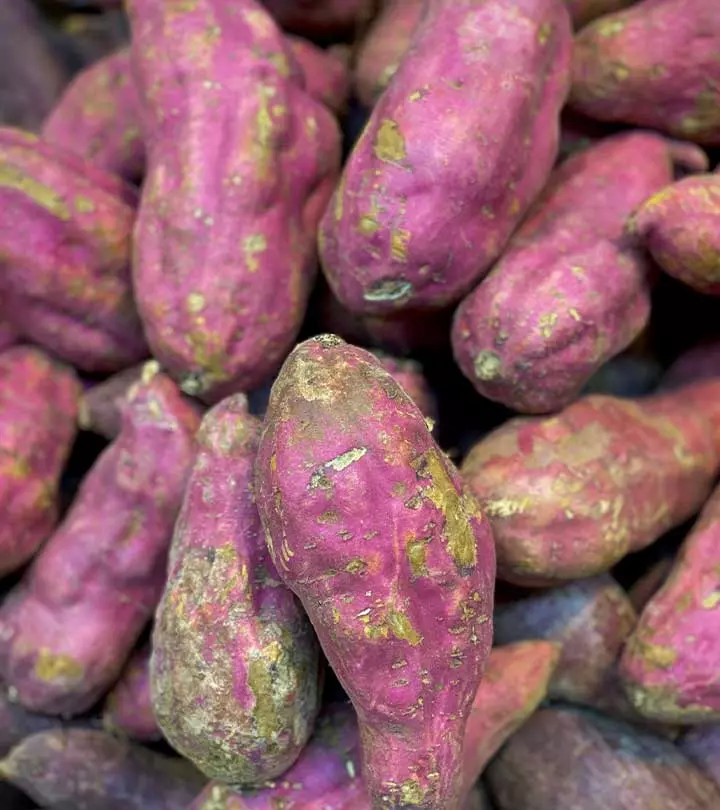
Image: Shutterstock
Purple yam is a tasty addition to many dishes and adds a unique color to them. Its nutritional value and sweet potato-like texture make it an excellent edible tuberi An underground stem with a thick, fleshy part that carries various buds for further production of a new plant. . The savory vegetable has been used in traditional medicine and is replete with many vitamins, minerals, and antioxidants. It regulates metabolism, controls weight, raises good cholesterol levels, and offers various healing benefits. The healthfulness of purple yams can be attributed to its acylated anthocyanin, an important antioxidant compound. As a result of its pleasant taste, global availability, and numerous health benefits, this vegetable can be a viable alternative to unhealthy chips and candies. Learn more about its nutritional facts, health benefits, and potential side effects you may need to be wary about.
 Know Your Ingredient: Purple Yam
Know Your Ingredient: Purple YamWhat Is It?
A vivid purple starchy root vegetable that has a sweet and nutty flavor.
What Are Its Benefits?
It may increase blood circulation, aid in weight loss, and support brain and digestive health.
Who Can Consume It?
Anybody can consume this except people on hormone medications and birth control.
How Often?
You can eat 1 cup of purple yam daily.
Caution
Excess consumption may cause vomiting and headaches.
In This Article
What Is Purple Yam?
Purple yam is a starchy vegetable belonging to the Dioscoreaceae family and is known as a greater yam. It is scientifically known as Dioscorea alata. This tuberi An underground stem with a thick, fleshy part that carries various buds for further production of a new plant. is often confused with sweet potatoes. Humans are familiar with about 600 species of yam. Purple yam has grayish-brown skin and purple flesh that resembles a sweet potato. You will find these tubersi An underground stem with a thick, fleshy part that carries various buds for further production of a new plant. in distinct shapes and sizes depending on their variety. These soften to attain a soft potato-like texture in the cooking process. Purple yams are incorporated for sweet or savory dishes and processed into starchy substances used to flavor and improve other preparations. While they have their origins in the Asian tropics, the yams are cultivated all over the world.
 Did You Know?
Did You Know?Purple yams have high fiber, low glycemic indexi Commonly called GI, it is a system used to measure the potential of foods that may increase the glucose level in the body. , and low sugar content. They offer complex carbohydrates, vitamins, minerals, and proteins. They also have a good balance of calcium, iron, copper, manganese, and phosphorus. These elements promote one’s overall health. Let us further understand the nutritional profile of purple yam from the section below.

Key Takeaways
- Purple yam is an Asian tuber with purple flesh, rich in fiber and contains many nutrients.
- It may help improve blood circulation, due to its potassium content, and vascular health.
- It may improve digestive health by boosting gut mobility and treating constipation.
- Purple yam is also used to make jams and for food coloring.
- Excess intake of purple yam may cause headaches in some people.
Nutrition Facts Of Purple Yam
100 grams of purple yam (yam) contain the following nutrients (1):
| Calories | 118 kcal |
Protein | 1.53 g |
Carbohydrate | 27.89 g |
Dietary Fiber | 4.1 g |
Potassium | 816 mg |
Phosphorus | 55 mg |
Let us now understand how these nutrients offer an array of health benefits.
Health Benefits Of Purple Yam
1. May Help Improve Blood Circulation
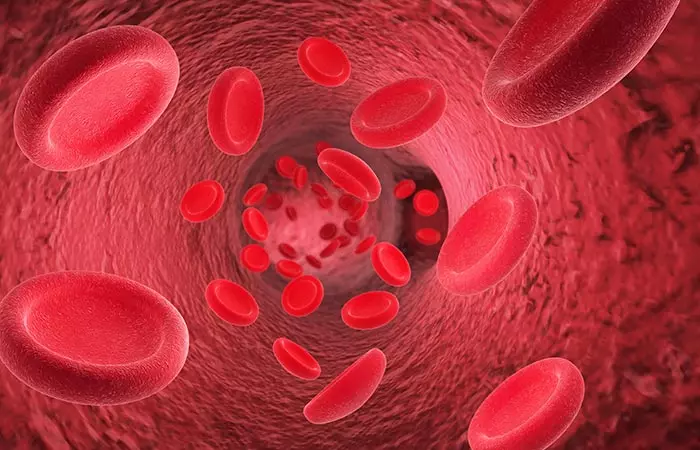
Yam is loaded with minerals like potassium that may improve blood circulation and regulate blood sugar levels. Potassium is also vasoactive and studies show that it may promote blood flow (2). In addition, anthocyanin, a purple pigment found in purple yam, plays a major role in blood circulation. Several studies have suggested that anthocyanin-rich foods may improve vascular health (health of the blood vessels) that help improve heart health (3).
2. May Help Treat Digestive Problems
The pectin (soluble fiber) in purple yams may help promote digestion. Fiber-rich foods help cleanse the intestines. Fiber has also been shown to improve gut motilityi The working of muscles in the gastrointestinal tract that aid the process of digestion in the body. and be an effective treatment and prevention strategy for constipation (4). Pectin also has unique properties that may prevent or treat intestinal infections (5).
3. May Reduce Cancer Risk

Purple yams are rich in vitamin C that is a potent anti-cancer agent. Vitamin C works to eliminate free radicals, which may otherwise increase cancer risk. In addition, antioxidants such as vitamin C are known to scavenge reactive oxygen species, preventing DNA damage and other cancer-associated effects (6).
4. May Help In Weight Loss
The yams are high in fiber, which may help reduce your calorie intake and promote weight loss. Fiber also keeps you satiated and discourages overeating (7). Furthermore, purple yams contain fewer calories. A low-calorie diet may help with weight management.
 Trivia
Trivia5. May Improve Brain Health

Purple yams are rich in anthocyanins. Many anthocyanins have shown anti-inflammatory and antioxidant properties.
The following graph is taken from a study published in the International Journal of Food Science that was conducted to profile the anthocyanin content from two types of Thai yams, KKFCRC and BKJ. Researchers found that the vine age did not significantly affect the anthocyanin content. However, it depended on the yam accession. In comparison to the BKJ yam, the KKFCRC yam has substantially higher anthocyanin levels.

Effect Of Vine Age On Antioxidant Compounds In Thai Purple Yams
Source: Profiling Anthocyanins in Thai Purple Yams (Dioscorea alata L.)In mice studies, these were also found to reduce cognition deficitsi Impairment or disability of different domains of cognition that cause a hindrance in various mental operations. (8). Anthocyanins also lower cellular death and are found to be neuroprotective (9). In addition, purple yams contain diosgenin, a compound associated with brain function and neuron growth. A study found that diosgenin can enhance neuronal excitation and memory function (10).
6. May Reduce Inflammation
Studies found that purple yam may help reduce inflammation. They contain saponins, anthocyanins, and other phytochemicals that help reduce the levels of pro-inflammatory cytokines that are responsible for inflammatory reactions in the body, leading to pain. They also help reduce oxidative stress by scavenging the reactive oxygen species, which are one of the prime causes of triggering inflammation (11). Chronic inflammation and an increase in oxidative stress-related protein in the body are linked to conditions like heart disease and diabetes (12), (13). Therefore, consuming fresh purple yam or its supplements may help reduce the risk of inflammatory conditions. However, more human studies are required to corroborate the claims.
These are the important benefits of purple yam. Keep reading to understand the culinary uses of purple yams, and how they can be added to your diet.
Culinary Versatility Of Purple Yam
Purple yam is a delicious and versatile ingredient that can add color and flavor to your meals. You can use it in various ways:
- You may try incorporating purple yam into your favorite baked goods, like muffins or bread.
- Blend cooked purple yam with your choice of fruits and yogurt for a nutritious and vibrant smoothie.
- Add chunks of purple yam to soups or stews for a hearty and colorful addition that boosts nutrition.
- You can make sweet or savory puddings by mashing cooked purple yams with coconut milk and a sweetener of your choice.
- Roasted purple yam cubes can add a sweet and earthy flavor to your salads, making them more filling.
- You can also make jam using purple yam with some basic ingredients at home.
By experimenting with these ideas, you may find that purple yam becomes a staple in your cooking! Here are a few recipes for you.
Purple Yam Recipes
1. Purple Yam Jam
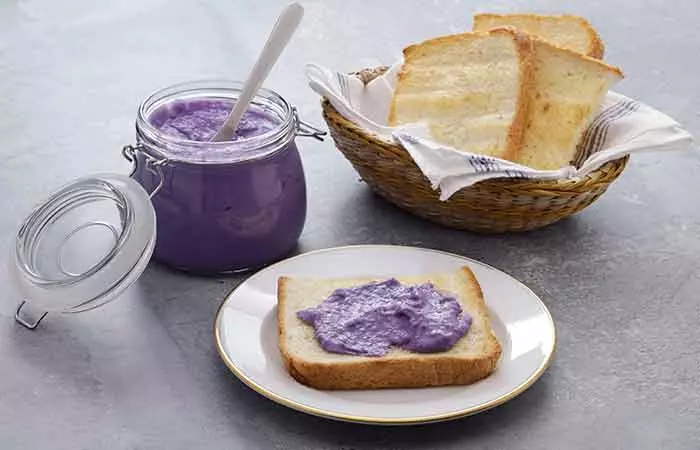
What You Need
- 750 grams of purple yam
- 1/4 cup of butter
- 1 can of condensed milk
- ½ can of unsweetened condensed milk
- 1 teaspoon of vanilla extract
Method
- Cook yams in boiling water until they turn tender. Peel the skin and gently grate the flesh.
- Melt the butter and add the condensed milk, vanilla extract, and yam flesh to a pan.
- Cook for 30 minutes on low heat until the mixture turns sticky. Add the unsweetened condensed milk and cook for another 15 minutes.
- Transfer it to a glass container and let it cool down to room temperature. It can be stored in the refrigerator for 3 days.
- It can be used as a spread or pudding or mixed with ice cream.
 Quick Tip
Quick Tip2. Roasted Purple Yam
What You Need
- 250 grams of purple yam
- 100 grams of red onions
- 5 tablespoons of olive oil
- 1/4 tablespoon of salt
- ½ a tablespoon of parsley, finely chopped
Method
- Preheat the oven to 425℉.
- Dice the purple yam and red onion roughly and toss them with the oil.
- Place them on a baking sheet.
- Bake them for 15 minutes or until you get a crisp texture.
- Sprinkle salt and parsley and serve hot.
A blogger shares her mom’s gluten- and dairy-free purple yam pancakes. The creative twist blends cultural influences, creating a comforting autumnal treat with a vibrant purple hue. She mentions, “Prague’s October skies have been grey lately, sprinkling us with rapid showers and the need to bundle up! Therefore, this autumnal change has made me yearn for some of the season’s comforting flavors. And that’s how I came up with a purple yam pancake with a fall twist (i).”
Although purple yam benefits health in many ways, one must also consider a few of their potential downsides. In most cases, excess consumption of this vegetable can trigger undesirable health effects. Learn more in the next section.
Side Effects Of Purple Yam
Headaches

Anecdotal evidence suggests that some people may experience headaches after eating purple yam in excess. In some cases, people may also experience vomiting.
Allergic Reactions
Some people may experience rashes and irritation with the use of wild yam (14). Intake of purple yam may have similar reactions in some people. Such reactions warrant a doctor’s visit.
Drug Interactions
Some research states that yam can increase the levels of estrone and estradiol (15). Hence, if you are taking any hormonal medications, do not include yam in your diet.
Many people confuse purple yam with sweet potato. Even though both sweet potatoes and yams are root vegetables, their taste, nutritional qualities, and origins are different. Read on to understand the key differences between purple yam and sweet potato.
Purple Yam Vs. Sweet Potato
| Purple Yam | Sweet Potato |
Purple yam is indigenous to Asia. | Sweet potatoes probably originated in Central and South America. |
Purple yams are somewhat rare to find. | Supermarkets often stock sweet potatoes. |
Rough, brown, scaly skin. | Smooth, orange, thin skin. |
Long and cylindrical. | Short and blocky. |
Dry and starchy. | Moist and sweet. |
Infographic: Purple Yam Benefits And Side Effects
Purple yam offers various health benefits, including aiding digestion and promoting weight loss due to its high fiber content. It is rich in anthocyanins and possesses anti-inflammatory and antioxidant properties. However, it is important to be aware of its potential side effects, such as headaches and allergic reactions in some individuals. Check out the infographic below for a better understanding of the benefits and risks before using it to improve your health.
Some thing wrong with infographic shortcode. please verify shortcode syntaxPurple yam is known for its unique color and is an excellent addition to many dishes. If included as a part of the diet, it can help boost blood circulation and prevent digestive problems and constipation. Purple yam may also reduce cancer risk due to the presence of vitamin C and improve the immune system. It also aids in weight loss and helps promote brain health thanks to its anthocyanins. However, some potential downsides of purple yams include headaches, allergic reactions, and medical interactions. Hence, caution is advised. Consume purple yams moderately to reap their benefits.
Frequently Asked Questions
Is purple yam safe for diabetics?
Yes, purple yam can be safe for people with diabetes when consumed in moderation. Its low glycemic index may have a lesser impact on blood sugar levels (16), (17). However, it is always best to consult a healthcare professional or a dietitian to determine the right portion for your diet.
What does purple yam taste like?
Purple yams have a sweet, nutty (pistachio-like) taste with a texture similar to potatoes when cooked.
Can you eat the skin of purple yams?
Yes, you can eat the skin on purple yams. However, if you choose to leave them on, scrub the skin under the running water to remove all dirt properly.
Is purple yam good for kidney disease?
Purple yams are high in potassium, and may not be suitable for individuals with kidney disease. Individuals with the condition are advised to consult their health care provider before introducing it into their diet.
Which is healthier: purple yam or cassava?
Cassava and purple yam are both starchy root vegetables with comparable nutrient profiles. The primary difference between the two is that cassava is more calorie-dense than purple yam.
Is purple yam an alkaline food?
Yams are alkaline food and can be added to an alkaline diet.
Illustration: What Is Purple Yam? Nutrition, Benefits, And Side Effects
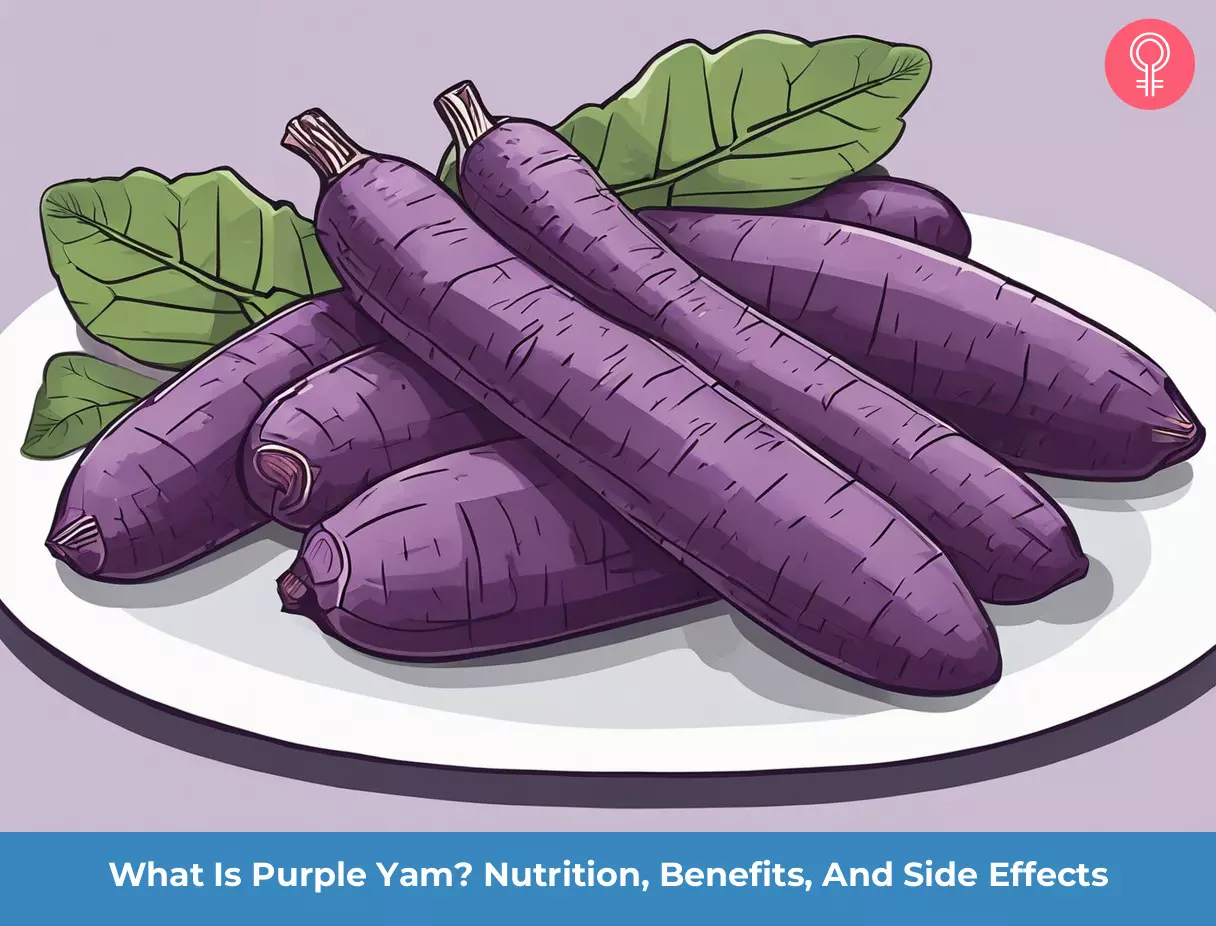
Image: Stable Diffusion/StyleCraze Design Team
The sweet flavor of purple yams makes them a delicious delicacy while their numerous health benefits act like a cherry on the top. Watch the video to know why you should incorporate this vegetable into your diet.
Personal Experience: Source
StyleCraze's articles are interwoven with authentic personal narratives that provide depth and resonance to our content. Below are the sources of the personal accounts referenced in this article.
i. PURPLE YAM PANCAKES WITH A FALL TWISThttps://thepraguebasket.wordpress.com/2017/10/08/purple-yam-pancakes-with-a-fall-twist/
References
Articles on StyleCraze are backed by verified information from peer-reviewed and academic research papers, reputed organizations, research institutions, and medical associations to ensure accuracy and relevance. Read our editorial policy to learn more.
- Purple Yam
https://fdc.nal.usda.gov/fdc-app.html#/food-details/170071/nutrients - Role of potassium in regulating blood flow and blood pressure
https://pubmed.ncbi.nlm.nih.gov/16467502/ - The Effect of Anthocyanin-Rich Foods or Extracts on Vascular Function in Adults: A Systematic Review and Meta-Analysis of Randomised Controlled Trials
https://www.ncbi.nlm.nih.gov/pmc/articles/PMC5579701/ - The Health Benefits of Dietary Fibre
https://www.ncbi.nlm.nih.gov/pmc/articles/PMC7589116/ - Effects of Dietary Fiber and Its Components on Metabolic Health
https://www.ncbi.nlm.nih.gov/pmc/articles/PMC3257631/ - Pro- and Antioxidant Effects of Vitamin C in Cancer in correspondence to Its Dietary and Pharmacological Concentrations
https://www.ncbi.nlm.nih.gov/pmc/articles/PMC6942884/ - Effect of Fibre Supplementation on Body Weight and Composition Frequency of Eating and Dietary Choice in Overweight Individuals
https://www.ncbi.nlm.nih.gov/pmc/articles/PMC5331580/ - Purple Sweet Potato Color Ameliorates Cognition Deficits and Attenuates Oxidative Damage and Inflammation in Aging Mouse Brain Induced by D-Galactose
https://www.ncbi.nlm.nih.gov/pmc/articles/PMC2766785/ - Neuroprotective Effects of Purple Sweet Potato Balinese Cultivar in Wistar Rats With Ischemic Stroke
https://www.ncbi.nlm.nih.gov/pmc/articles/PMC6290418/ - Diosgenin-Rich Yam Extract Enhances Cognitive Function: A Placebo-Controlled Randomized Double-Blind Crossover Study of Healthy Adults
https://www.ncbi.nlm.nih.gov/pmc/articles/PMC5691776/ - Dioscorea spp.: Comprehensive Review of Antioxidant Properties and Their Relation to Phytochemicals and Health Benefits
https://www.ncbi.nlm.nih.gov/pmc/articles/PMC9026138/ - Inflammation and Cardiovascular Diseases: The Most Recent Findings
https://www.ncbi.nlm.nih.gov/pmc/articles/PMC6719998/ - The global diabetes epidemic as a consequence of lifestyle-induced low-grade inflammation
https://pubmed.ncbi.nlm.nih.gov/19890624/ - Final report of the amended safety assessment of Dioscorea Villosa (Wild Yam) root extract
https://pubmed.ncbi.nlm.nih.gov/15513824/ - Estrogenic effect of yam ingestion in healthy postmenopausal women
https://pubmed.ncbi.nlm.nih.gov/16093400/ - Estimation of Nutritional and Starch Characteristics of Dioscorea alata (Water Yam) Varieties Commonly Cultivated in the South-Eastern Nigeria
https://www.researchgate.net/publication/281675400_Estimation_of_Nutritional_and_Starch_Characteristics_of_Dioscorea_alata_Water_Yam_Varieties_Commonly_Cultivated_in_the_South-Eastern_Nigeria - The Effect of Dietary Glycaemic Index on Glycaemia in Patients with Type 2 Diabetes: A Systematic Review and Meta-Analysis of Randomized Controlled Trials
https://pmc.ncbi.nlm.nih.gov/articles/PMC5872791/
Read full bio of Nilofar Pendhari
Read full bio of Aparna Mallampalli
Read full bio of Ravi Teja Tadimalla
Read full bio of Payal Karnik






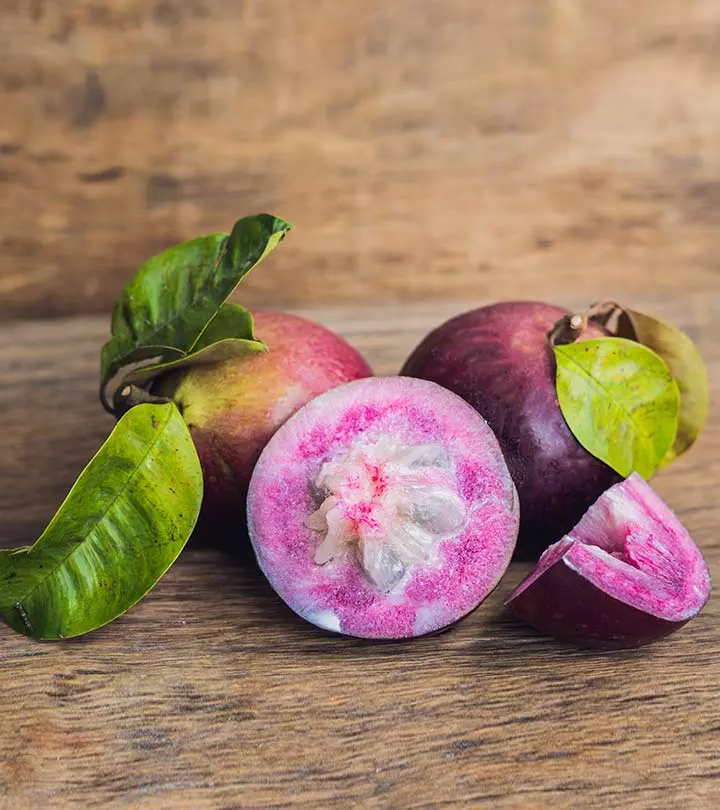
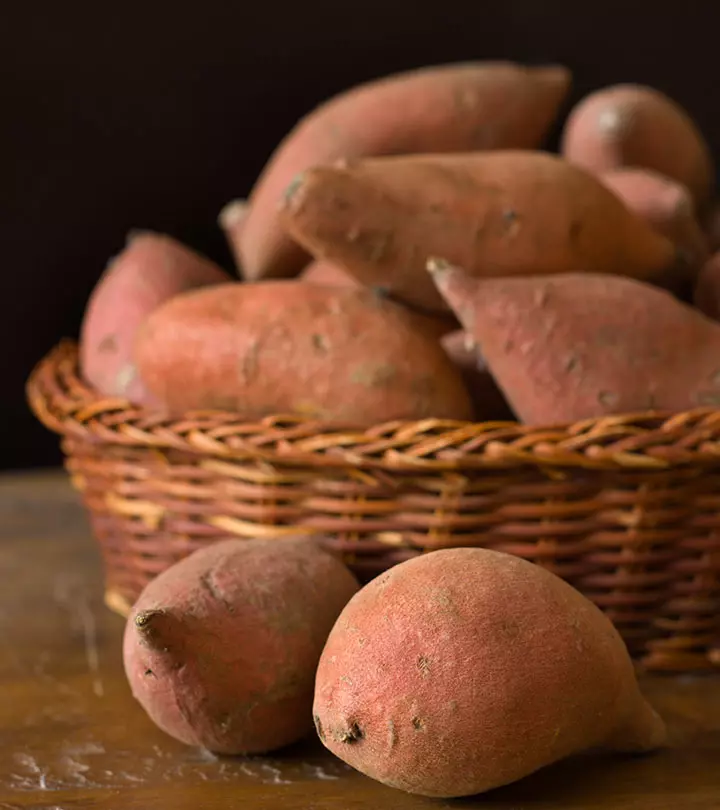
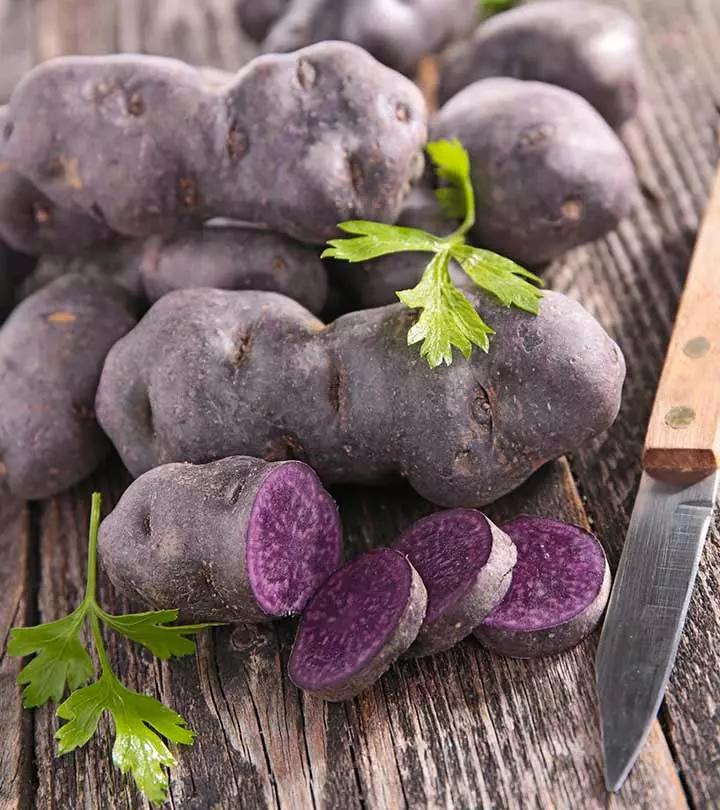

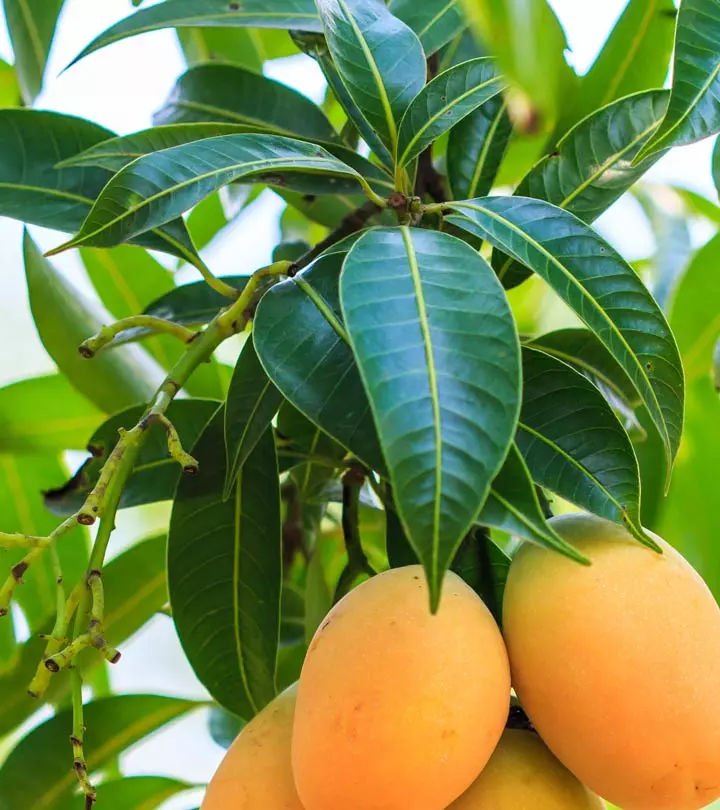
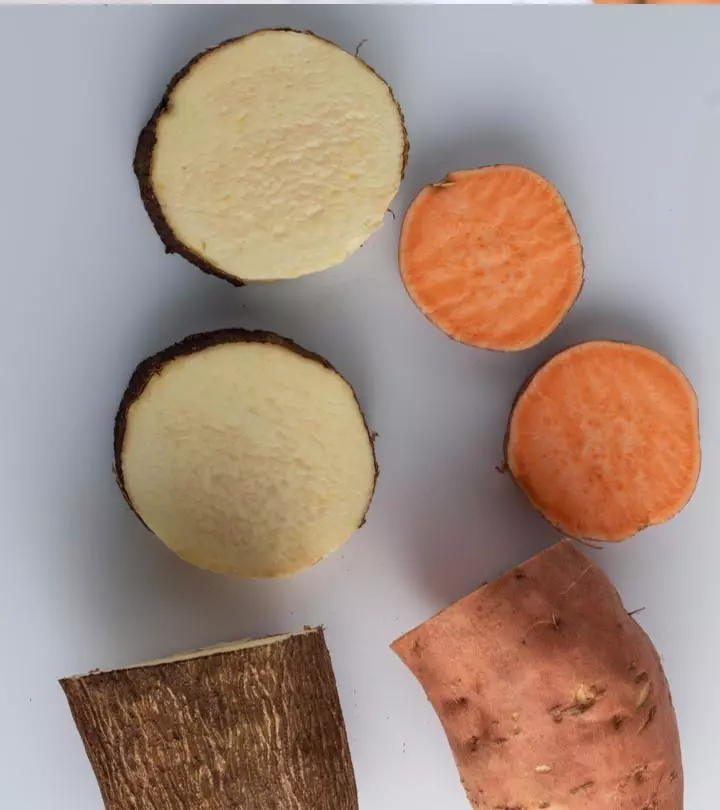
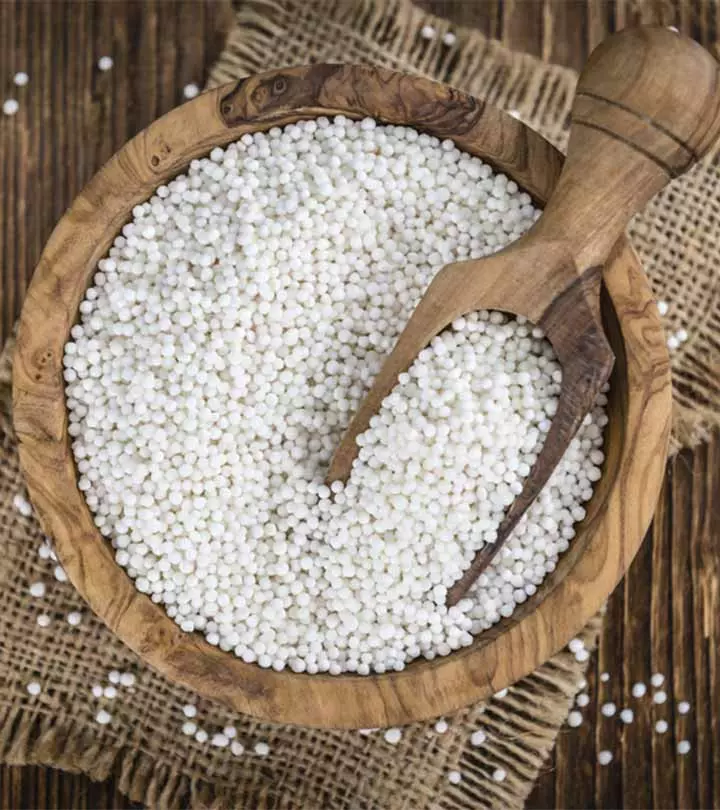
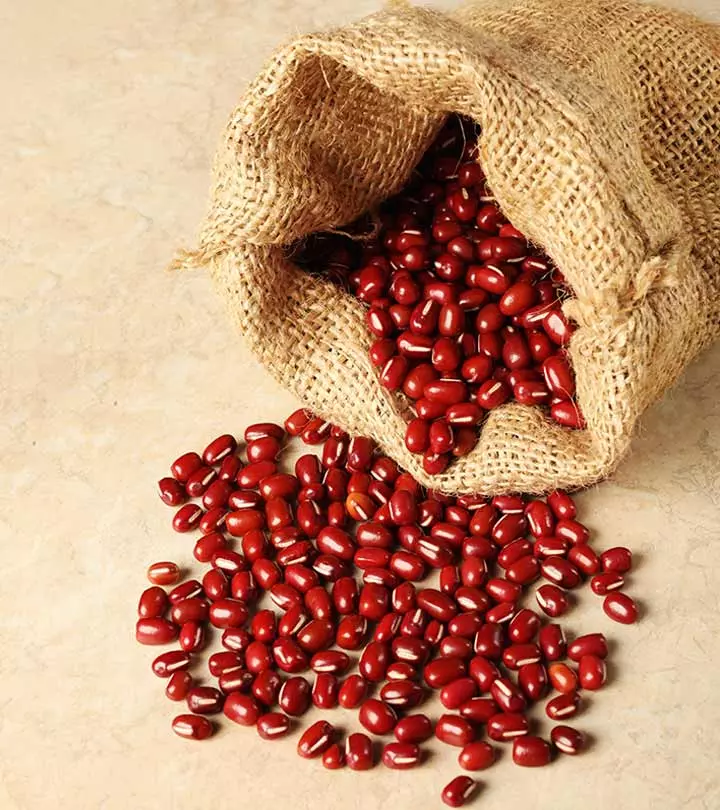
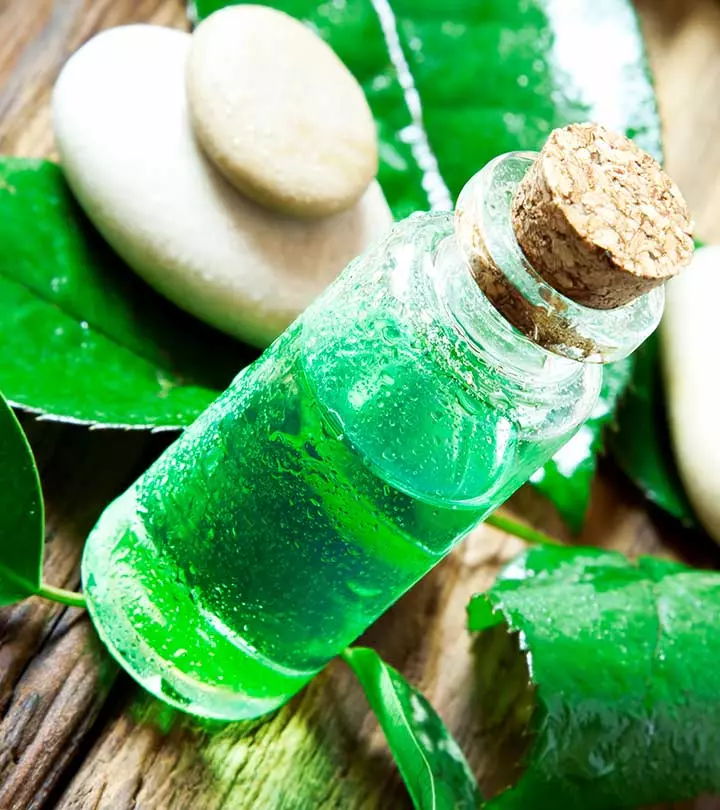

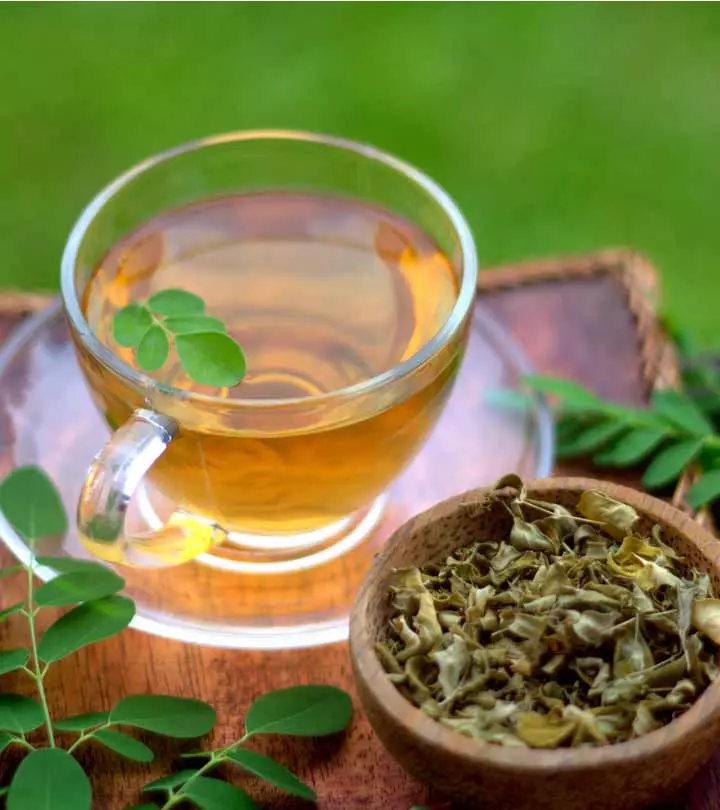
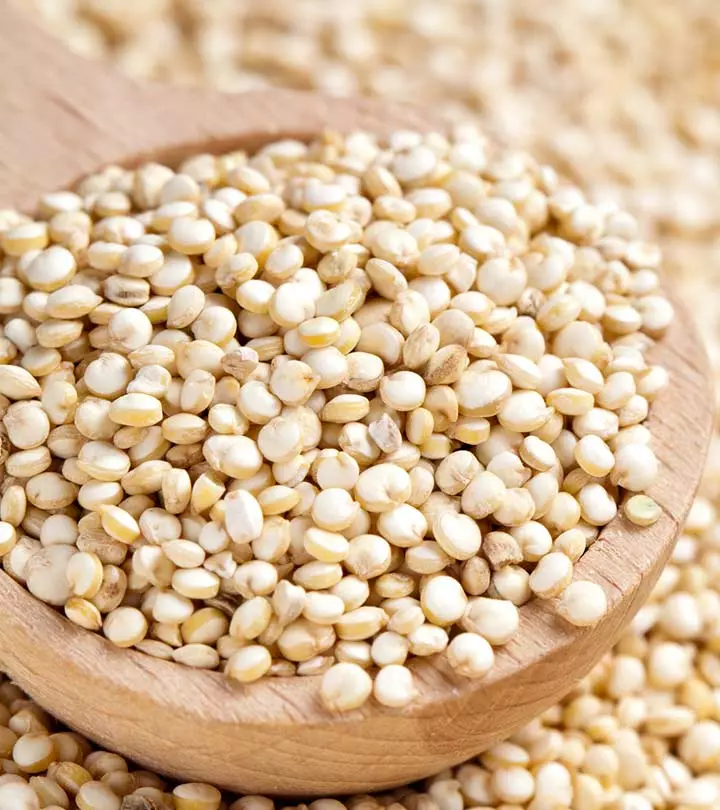
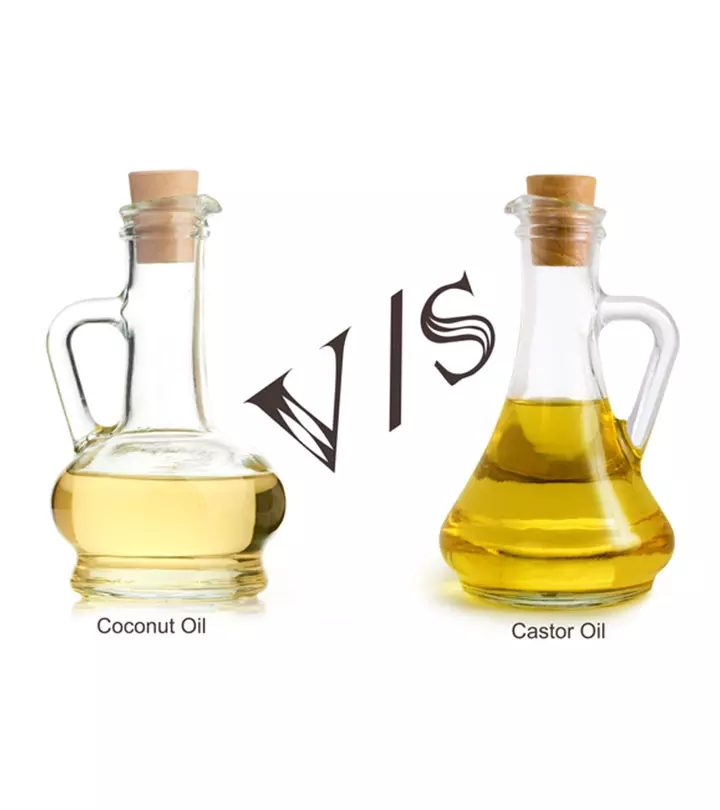

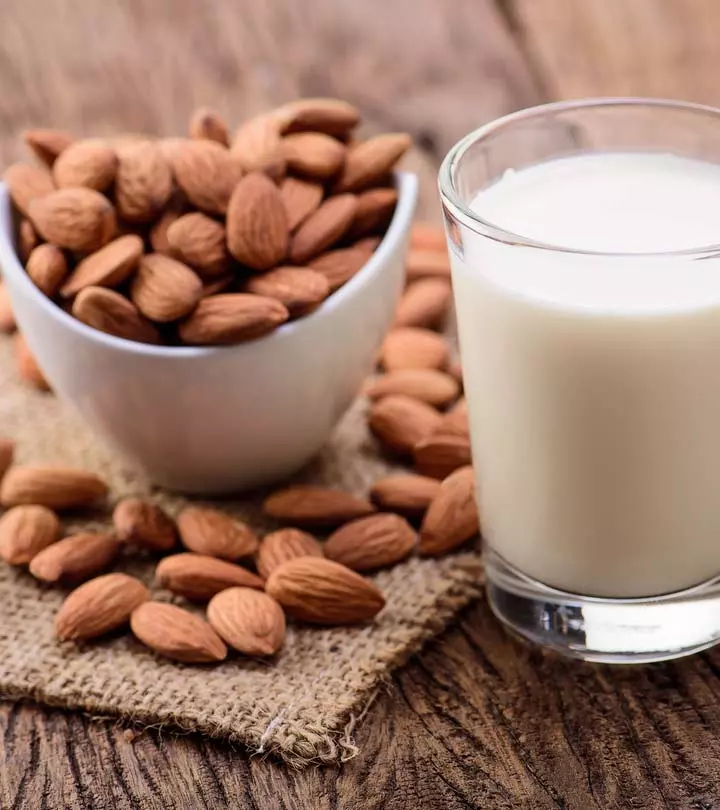
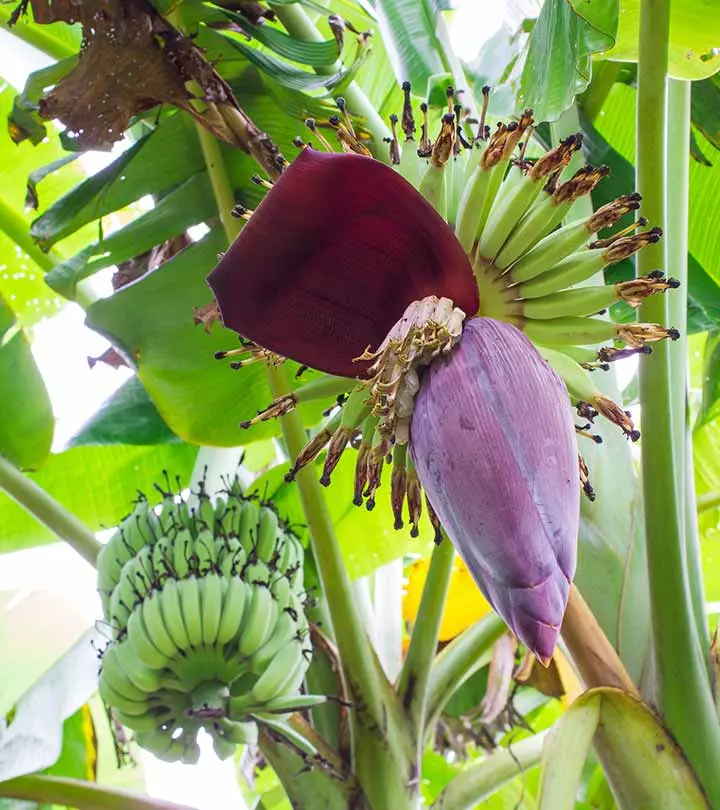
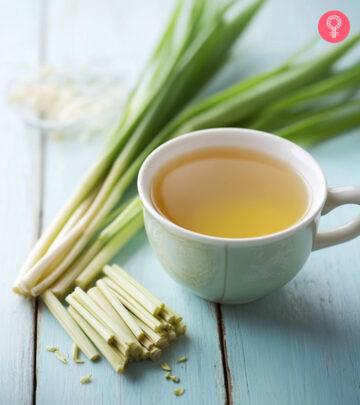


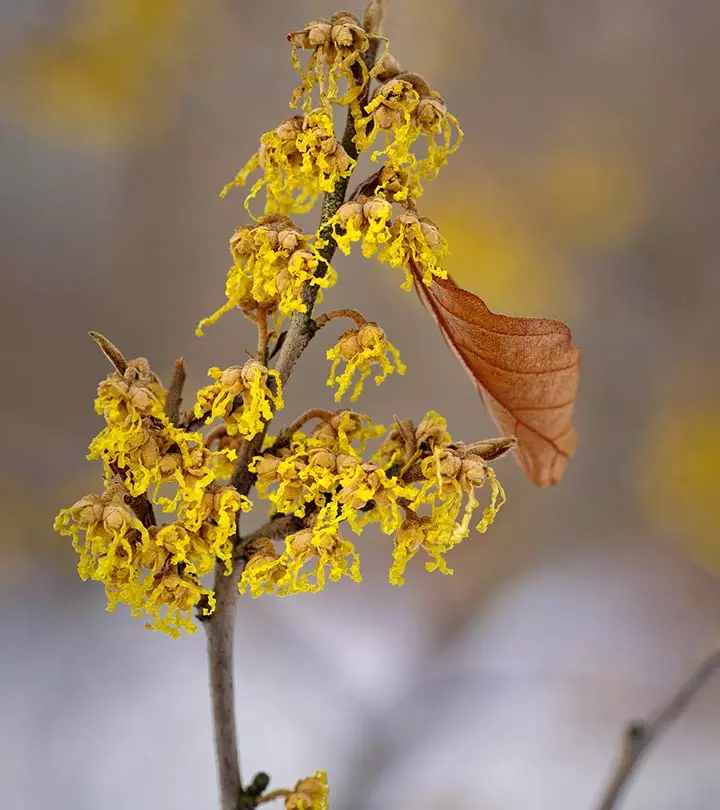
Community Experiences
Join the conversation and become a part of our empowering community! Share your stories, experiences, and insights to connect with other beauty, lifestyle, and health enthusiasts.